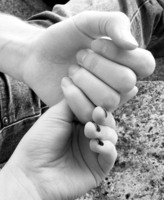
A friend is someone who knows you as you are, understands where you’ve been, accepts who you’ve become, and still, gently invites you to grow. Anonymous
I am not your friend, I am your father, (or mother, or teacher). I have heard this from many mothers, fathers and, teachers over the years.
It seems ironic to me that a parent who knows his child, understands him, and wants him to grow is unwilling to consider himself a friend. What is it that is so uncomfortable or inappropriate about being your child’s parent or teacher and at the same time, her friend?
That was a trick question. The trick to it is the part about “at the same time.” There are times when parents are responsible for setting boundaries, expressing expectations, and maintaining distinctions between adult behaviors and behaviors that are appropriate for children. There are other times when both parents (and teachers) and children can benefit from relating to one another as friends.
I recently spoke with a young woman who teaches sixth graders. She described how she had created a second relationship with one of the children in her class, which she described as friendship.
We’ve gone window shopping together, and talked over pizza and a Coke. It took a few months, but now I feel like we have really relaxed conversations the way we have with other friends. In the classroom, I treat her the same as the other girls, and she treats me like a teacher. She’s always been appropriate towards me as a teacher in school even though we have our friendship outside of school.
I think this teacher and her students are both benefiting from this dual relationship, and I know that her menaheles thinks so too because she encourages her teachers to learn how to do what this teacher is doing so well.
But is it appropriate for a parent to be their child’s friend at any time? Is it the right thing to do?
Yes it is. And here’s how I know:
Dvarim 13:7 describes a list of people as follows, “your brother, your son, your daughter, your wife, your friend who is like yourself.” Rashi says that the expression “your friend who is like yourself” is a reference to your father (see the Ikar Sfsei Chachamim ibid). The Aimek ha’Netziv explains that a person wishes that his friend be someone who loves him with all his heart and all his soul, and that “a father loves his child more than anyone else in the world” (my translation of the Aimek ha’Netziv on Parshas Re-eih, Piska 36).
Rav Shimshon Rafael Hirsch zt”l wrote:
It is at this time that he requires more than ever the support, the friendly direction, the eye and the tongue of a loving father. And will you just at this time thrust him out into the big wide world, and at fourteen, fifteen, sixteen years expose him to the struggles which arise in his own nature apart from those to which evil example, seduction and temptation will expose him…
In those years, parents, become friends or your children; let the son and the daughter have no greater or closer friend than father and mother - parents, too, have no greater or more natural friends than their children when grown up. As in their childhood years, son and daughter must go on living their lives openly and truthfully under your eyes, they must pour their heart into yours, and should heaven and earth abandon them they must ever find loyal support, at once kindly and stern, in father and mother. And will you thrust from you this boon of friendship, the fairest flower of the relationship between parents and children? It will certainly blossom for you if you yourselves do not crush it out of sheer ignorance, if you do not insist on seeing in the young man and young woman nothing more than a mere boy and girl, if you do not forget that as they grow older they must be treated differently and you must become friends to them in order that they may become friends to you. (Horeb, paragraph 555)
Clearly, it is appropriate, sometimes, to be your child’s friend. What makes you uncomfortable?
I’m concerned that if I lower myself to my child’s level she will never respect me the way she needs to most of the time.
I would not suggest that you lower yourself to your child’s level. I would rather you raise her to yours from time to time. Let her learn how adults talk and listen to one another, and then let her go back to being a child. You will probably find that she is a more confident child, and you’re a more successful parent.
Rabbi Yitzchak Shmuel Ackerman, LMHC, has been working with parents for over 30 years. He can be reached at 718-344-6575. Men’s and women’s groups now available. Call for details.

 Previous
Previous

